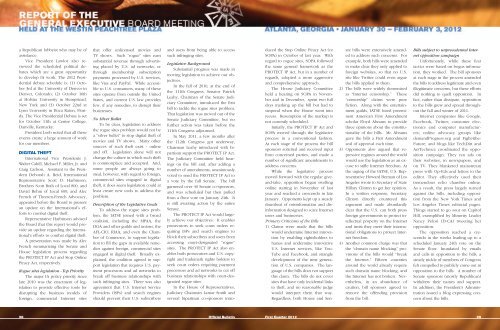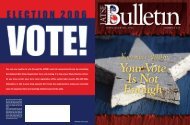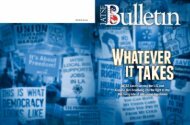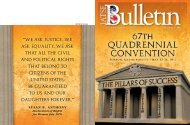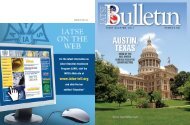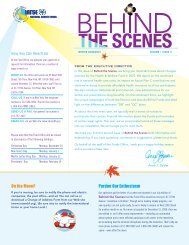635 - IATSE Local 8 Philadelphia
635 - IATSE Local 8 Philadelphia
635 - IATSE Local 8 Philadelphia
You also want an ePaper? Increase the reach of your titles
YUMPU automatically turns print PDFs into web optimized ePapers that Google loves.
a Republican lobbyist who may be of<br />
assistance.<br />
Vice President Lawlor also reviewed<br />
the scheduled political debates<br />
which are a great opportunity<br />
to develop IA work. The 2012 Presidential<br />
debate schedule is: (1) October<br />
3rd at the University of Denver in<br />
Denver, Colorado; (2) October 16th<br />
at Hofstra University in Hempstead,<br />
New York and (3) October 22nd at<br />
Lynn University in Boca Raton, Florida.<br />
The Vice Presidential Debate is set<br />
for October 11th at Centre College,<br />
Danville, Kentucky.<br />
President Loeb noted that all these<br />
events create a large amount of work<br />
for our members.<br />
DIGITAL THEFT<br />
International Vice Presidents J.<br />
Walter Cahill, Michael F. Miller, Jr. and<br />
Craig Carlson, Assistant to the President<br />
Deborah A. Reid, International<br />
Representative Scott D. Harbinson,<br />
Brothers Scott Roth of <strong>Local</strong> 800, and<br />
David Behm of <strong>Local</strong> 600, and Alec<br />
French of Thorsen-French Advocacy,<br />
appeared before the Board to present<br />
an update on the International’s efforts<br />
to combat digital theft.<br />
Representative Harbinson advised<br />
the Board that this report would provide<br />
an update regarding the International’s<br />
efforts to combat digital theft.<br />
A presentation was made by Alec<br />
French summarizing the Senate and<br />
House legislation process regarding<br />
the PROTECT IP Act and Stop Online<br />
Piracy Act, respectively.<br />
Rogue sites legislation - Top Priority<br />
The major IA policy priority since<br />
late 2010 was the enactment of legislation<br />
to provide effective tools for<br />
disrupting the business models of<br />
foreign, commercial Internet sites<br />
that offer unlicensed movies and<br />
TV shows. Such “rogue” sites earn<br />
substantial revenue through advertising<br />
placed by U.S. ad networks, or<br />
through membership subscription<br />
payments processed by U.S. services,<br />
like Visa and PayPal. While accessible<br />
to U.S. consumers, many of these<br />
sites operate from outside the United<br />
States, and current U.S. law provides<br />
few, if any remedies, to disrupt their<br />
businesses.<br />
No Silver Bullet<br />
To be clear, legislation to address<br />
the rogue sites problem would not be<br />
a “silver bullet” to stop digital theft of<br />
movies and TV shows. Many other<br />
sources of such theft exist - online<br />
and off. Legislation alone will not<br />
change the culture in which such theft<br />
is commonplace and accepted. And,<br />
some people are always going to<br />
steal, however, with regard to foreign,<br />
commercial sites engaged in digital<br />
theft, it does seem legislation could at<br />
least create new tools to address the<br />
problem.<br />
Description of the Legislative Goals<br />
To address the rogue sites problem,<br />
the <strong>IATSE</strong> joined with a broad<br />
coalition, including the MPAA, the<br />
DGA and other guilds and unions, the<br />
AFL-CIO, RIAA, and even the Chamber<br />
of Commerce, to support legislation<br />
to fill the gaps in available remedies<br />
against foreign, commercial sites<br />
engaged in digital theft. Broadly explained,<br />
the coalition agreed to support<br />
legislation that requires U.S. payment<br />
processors and ad networks to<br />
break off business relationships with<br />
such infringing sites. There was also<br />
agreement that U.S. Internet Service<br />
Providers (ISPs) and search engines<br />
should prevent their U.S. subscribers<br />
and users from being able to access<br />
such infringing sites.<br />
Legislative Background<br />
Substantial progress was made in<br />
moving legislation to achieve our objectives.<br />
In the fall of 2010, at the end of<br />
the 111th Congress, Senator Patrick<br />
Leahy, Chairman of the Senate Judiciary<br />
Committee, introduced the first<br />
bill to tackle the rogue sites problem.<br />
That legislation was moved out of the<br />
Senate Judiciary Committee, but no<br />
further action was taken before the<br />
111th Congress adjourned.<br />
In May 2011, a few months after<br />
the 112th Congress got underway,<br />
Chairman Leahy introduced with bipartisan<br />
support the PROTECT IP Act.<br />
The Judiciary Committee held hearings<br />
on the bill and, after adding a<br />
number of amendments, unanimously<br />
voted to send the PROTECT IP Act to<br />
a vote by the full Senate. The bill<br />
garnered over 40 Senate co-sponsors,<br />
and was scheduled but then pulled<br />
from a floor vote on January 24th. It<br />
is still awaiting action by the entire<br />
Senate.<br />
The PROTECT IP Act would largely<br />
achieve our objectives. It enables<br />
prosecutors to seek court orders requiring<br />
ISPs and search engines to<br />
block their subscribers and users from<br />
accessing court-designated “rogue”<br />
sites. The PROTECT IP Act also enables<br />
both prosecutors and U.S. copyright<br />
and trademark rights holders to<br />
seek court orders requiring payment<br />
processors and ad networks to cut off<br />
business relationships with court-designated<br />
rogue sites.<br />
In the House of Representatives,<br />
Judiciary Chairman Lamar Smith and<br />
several bipartisan co-sponsors introduced<br />
the Stop Online Piracy Act (or<br />
SOPA) in October of last year. With<br />
regard to rogue sites, SOPA followed<br />
the same general framework as the<br />
PROTECT IP Act, but in a number of<br />
regards, adopted a more aggressive<br />
and comprehensive approach.<br />
The House Judiciary Committee<br />
held a hearing on SOPA in November<br />
and in December, spent two full<br />
days marking up the bill but had to<br />
suspend when the House went into<br />
recess. Resumption of the markup is<br />
not currently scheduled.<br />
Initially, the PROTECT IP Act and<br />
SOPA moved through the legislative<br />
process in a conventional fashion.<br />
At each stage of the process the bill<br />
sponsors solicited and received input<br />
from concerned parties, and made a<br />
number of significant amendments to<br />
address concerns.<br />
While the legislative process<br />
moved forward with the regular giveand-take,<br />
opposition began swelling<br />
online starting in November of last<br />
year and reached a crescendo in late<br />
January. Opponents kept up a steady<br />
drumbeat of misinformation and disinformation<br />
designed to scare Internet<br />
users and businesses.<br />
Primary Criticisms of the Bills<br />
1) Claims were made that the bills<br />
would undermine Internet innovation<br />
by enabling rightsholders to<br />
harass and undermine innovative<br />
U.S. Internet services, like You-<br />
Tube and Facebook, and strangle<br />
development of the next generation<br />
of U.S. companies. The language<br />
of the bills does not support<br />
this claim. The bills do not cover<br />
sites that have only incidental links<br />
to theft, and no reasonable judge<br />
would interpret them that way.<br />
Regardless, both House and Senate<br />
bills were extensively amended<br />
to address such concerns. For<br />
example, both bills were amended<br />
to make clear they only applied to<br />
foreign websites, so that no U.S.<br />
site like Twitter could even argue<br />
the bills applied to them.<br />
2) The bills were widely demonized<br />
as “Internet censorship.” These<br />
“censorship” claims were pure<br />
fiction. Along with the entertainment<br />
guilds, <strong>IATSE</strong> hired preeminent<br />
American First Amendment<br />
scholar Floyd Abrams to provide<br />
three opinions about the constitutionality<br />
of the bills. Mr. Abrams<br />
gave the bills a First Amendment<br />
seal of approval each time.<br />
3) Opponents also argued that repressive<br />
regimes around the world<br />
would use the legislation as an excuse<br />
to stifle Internet freedom. At<br />
the urging of the <strong>IATSE</strong>, U.S. Representative<br />
Howard Berman of Los<br />
Angeles wrote to Secretary of State<br />
Hillary Clinton to get her opinion.<br />
In a written response, Secretary<br />
Clinton directly countered this<br />
argument and made abundantly<br />
clear that the U.S. can both press<br />
foreign governments to protect intellectual<br />
property on the Internet<br />
and insist they meet their international<br />
obligations to protect Internet<br />
freedom.<br />
4) Another common charge was that<br />
the “domain name blocking” provisions<br />
of the bills would “break<br />
the Internet.” Fifteen countries<br />
around the world already require<br />
such domain name blocking, and<br />
the Internet has not broken. Nevertheless,<br />
in an abundance of<br />
caution, bill sponsors agreed to<br />
remove the offending provision<br />
from the bill.<br />
Bills subject to unprecedented Internet<br />
opposition campaign<br />
Unfortunately, while these fear<br />
tactics were based on bogus information,<br />
they worked. The bill sponsors<br />
at each stage in the process amended<br />
the bills to address legitimate and even<br />
illegitimate concerns, but these efforts<br />
did nothing to quell opposition. In<br />
fact, rather than dissipate, opposition<br />
to the bills grew and spread throughout<br />
the fall and winter of 2011.<br />
Internet companies like Google,<br />
Facebook, Twitter; consumer electronics<br />
and computer manufacturers;<br />
online advocacy groups like<br />
demandProgress.org and Fight4the-<br />
Future; and blogs like TechDirt and<br />
ArsTechnica coordinated the opposition<br />
campaign. They ran ads on<br />
their websites, in newspapers, and<br />
on TV. They blanketed mainstream<br />
press with Op-Eds and letters to the<br />
editor. They effectively used their<br />
tremendous echo chamber online.<br />
As a result, the press largely turned<br />
against the bills, including opposition<br />
from the New York Times and<br />
Los Angeles Times editorial pages.<br />
Things started to go sour on Capitol<br />
Hill, exemplified by Minority Leader<br />
Nancy Pelosi (D-CA) tweeting her<br />
opposition.<br />
The opposition reached a crescendo<br />
in the weeks leading up to a<br />
scheduled January 24th vote on the<br />
Senate floor. Inundated by emails<br />
and calls in opposition to the bills, a<br />
steady trickle of members of Congress<br />
felt compelled to publicly come out in<br />
opposition to the bills. A number of<br />
Senate sponsors (mostly Republican)<br />
withdrew their names and support.<br />
In addition, the President’s Administration<br />
issued a blog expressing concern<br />
about the bills.<br />
28 Official Bulletin First Quarter 2012 29


